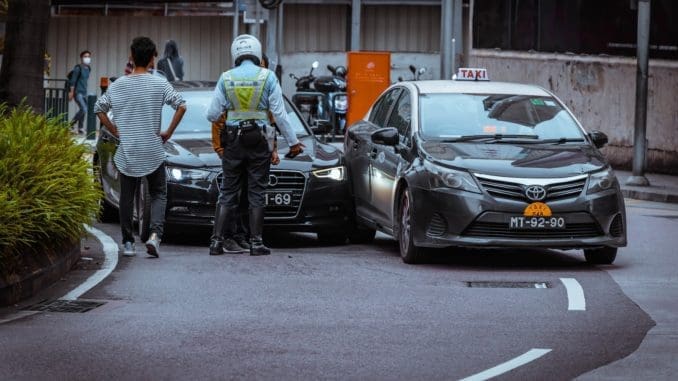
Before Accidents Happen
While our job is to help victims who have been in a car accident, we feel it is essential to provide information that can help you avoid an accident. Here are a few things you can do before an automobile accident to help:
Know Your Blind Spots
Constantly adjust your mirrors to provide you with the best possible panoramic scene. But remember, you cannot see every angle around your car with your mirrors. You must physically look directly into the lanes beside you to ensure no vehicle is in your blind spot.
Keep an Alert Lookout
Always scan the areas ahead of you. Don’t just focus on the car ahead of you. Look to the car ahead of him and so on. Sweep to the left and the right when approaching intersections, even if you have the green light.
Keep your Hands at 9 and 3 o’clock
It may seem lame, but this is the safest position for your hands. If you are hit by another vehicle, this is your best chance of maintaining control over your vehicle.
Follow at a Safe Distance
Always maintain a safe distance between you and the car ahead of you. This allows you to make for a safe stop in case the vehicle in front of you slams on the brakes.
Buckle Your Seatbelt
Research shows the best way to avoid serious injury is to wear your seatbelt.
Put Children in the Proper Car Seat
Ensure the seat is installed correctly and that the child stays in the seat, buckled at all times.
Transport heavy objects in the trunk of your car
This can help reduce the risk of injury if an accident does occur.
Get Rid of Distractions
Keep your radio at a level that allows you to hear approaching emergency vehicles. Do not take your eyes off the road to pick up an item, change the radio or answer your cell phone. NEVER text and drive.
Review your insurance coverage to make sure you are adequately protected
Every state has rules regarding liability carriage, covering damages if you are at fault in a car accident. When your agent says you are “fully” covered, it may only mean you have just the minimum limits above. You should always carry enough liability coverage to protect your assets should you get sued. Some insurers also offer combined “uninsured/ underinsured” coverage to protect you if the negligent person does not have good coverage.
Place a disposable camera in your car or use your cell phone to take pictures of the scene and where the cars are after an accident.
Be sure you have your updated vehicle registration, insurance card, and inspection information readily available in your car.
Be sure your driver’s license is current and valid.
After an accident:
If you’ve ever been involved in a serious accident, you know how easy it is to say or do the wrong thing in the following moments.
In a car accident, your mind is racing about many things. Am I okay? Is my car repairable? What do I do now? In the midst of this, there are things you can do to hopefully limit your stress and the anxiety of having an accident.
Here’s a checklist to help you make the right decisions when your life gets out of control.
STOP. Stay calm.
If you get in a car accident, you must stop. DO NOT leave the accident scene (unless you fear for your life). If possible, move your car to the side of the road for safety until the police arrive. If you leave, that’s known as a “hit and run” and might be a felony. This includes hitting property, animals, or pedestrians.
If your vehicles are impeding the safe flow of traffic, move them to the side of the road if it can be done safely. Put your flashers on immediately. Do not stand in the roadway near your vehicle if it is dark outside.
CALL 911. Call an Ambulance.
Call for an ambulance if there are, or even if you suspect that there could be injuries. Injuries often manifest themselves after a delay of up to one hour or more. A person with a head injury is probably incapable of determining whether or not they need help and will often refuse help. If the accident is serious, you should probably call for an ambulance and let trained professionals determine the nature of the injuries, if any.
NEVER agree not to call the police, even if you are offered money.
The law often requires the police to investigate accidents, and you never know what might develop later if you don’t get the police involved. Besides, if someone is asking you not to call the police, something is wrong, and you need to find a police officer ASAP. Your own safety may be at risk.
WAIT.
Find a safe place away from traffic to wait for police and fire rescue personnel to arrive. Onlookers driving by often cause additional accidents while they are gawking at yours. WHILE YOU ARE WAITING. If there are injuries, provide first aid taught in paediatric first aid course to the best of your ability. But only do so if you can do so SAFELY, without sustaining any further injury yourself! Your first duty in an accident is always to protect yourself first and everyone else second. You can’t help others if you do something stupid that will hurt you.
STAY AWAY FROM TRAFFIC and ALL OTHER POSSIBLE DANGERS. This is also an excellent time to locate your license, registration, and proof of insurance if there are no injuries. But again, only do so if your vehicle has been moved safely out of traffic.
ADMIT NOTHING. DO NOT ADMIT GUILT!
I don’t care if it was your fault; admit nothing. There will be ample time to admit guilt and do the right thing later after your rights have been protected. If there are no injuries, this is an excellent time to get your attorney on the phone and get some advice. Under the stress of an accident, it’s elementary to make admissions of guilt when you were not even at fault. Call your attorney and wait until all the facts are in before you give away everything you own with a poorly-timed confession.
NOW SHUT UP.
You’ve already done everything you need to; now it’s time to shut up and wait for help. NEVER speak to the other driver(s) or their insurance company, EVER; that goes double while you’re still on the scene of the accident. Talk to the police and no one else. Be honest and factual, giving only the facts EXACTLY as you remember them, and being careful not to draw any conclusions.
If you don’t remember something, say so. EVERYTHING you say to the police may be used against you. So think twice BEFORE you speak even once.
GATHER INFORMATION.
Again, safety comes first. And many facts may be available to you by requesting a copy of the police report. But don’t trust your memory. I don’t care how good it is; this is when it’s most likely to fail you. Take pictures; most cell phones have cameras – now is an excellent time to start snapping pictures.
Get the names, addresses, and telephone numbers of any possible witnesses. Everything you document now will help you later should a lawsuit develop. Write down every little detail. Everything is important. No detail is too small or insignificant.
DO NOT SMOKE! – Accidents Happen
Smokers may want to reach for a cigarette now, but DON’T! Damaged vehicles often release flammable liquids and gasses following an accident. DO NOT SMOKE! If you smell gasoline, get away from the vehicles and any gasoline leaking. Gasoline sometimes flows downhill, away from the accident scene. Pay attention and pick a safe place to wait for help. Assume all liquids at the scene are flammable, and you won’t make any mistakes.
These are good guidelines to follow in the event of a serious accident. But they are also very general. Every accident is different. Think BEFORE you act. USE YOUR HEAD.
The advice herein is not a substitute for sound thinking and common sense. Use these steps as a guideline and adapt them to meet your needs at your accident scene.
This post is designed as a memory aid to help you remember the things you might forget while under stress, nothing more. Remember, Accidents happen.
Protect your claim with the insurance company:
Call your insurance company to report the claim.
Your insurance company can help start getting your vehicle repaired and possibly get you a rental car quicker than the at-fault driver’s insurer.
Don’t give a recorded statement to the at-fault insurance company.
You may provide them with details about the accident, but do not let them record you. You could still be upset following the accident, and you do NOT want this recorded statement to be used as evidence against you later. NOTE: You must cooperate with your insurance carrier, including giving them a recorded statement. You should always have your attorney present during your recorded statement.
If you are hurt, don’t delay in getting treatment.
Insurance companies often take the position that if you were really hurt, you would have sought treatment immediately. However, sometimes you don’t start to feel pain until a day or two later. The insurance companies prefer to see the injuries noted by a medical doctor, not just by your own statements.
It can be helpful to have property damage estimates done, but it is not always necessary, depending on what the insurance company recommends.
Get a copy of the police report and review it to be sure it is accurate as to how the accident happened and who was in the vehicles. If it is inaccurate, contact the office to report any needed changes. If it is accurate, getting a copy to the insurance company can usually speed things along. Sometimes you can go online and download the report.
If your vehicle is a total loss, stay on the insurance company to get the property damage squared away. The insurance companies will not pay for a rental for very long, nor will they pay for the storage that accumulates due to a delay on your part.
If you are injured, never sign a medical authorization for the at-fault insurance carrier.
You should request your own bills and records to review before submitting them to the insurance company. The doctors often send items unrelated to the accident containing personal information irrelevant to the accident.
If you are injured, never sign a release or take money on your case until you know the longer-term impact of your injuries. Some insurance companies are at your door within 24 hours of an accident, offering you a certain amount of money and saying they will pay up to a certain amount of your medical bills.
Medical care can be extremely costly. Depending on your injuries, the amount offered may not be enough, and your bills could exceed what they indicated they would pay. In addition, the insurance adjuster will ask you to sign a limited release which they say will pay for continued medical treatment up to a certain amount.
BEWARE: these releases typically leave it up to the insurance company (not your doctor) as to what is “reasonable and necessary” treatment. In many cases, the insurance company will later deny your treatment.
If you must miss work, be sure you get a doctor’s note. An insurance company and many juries will not pay you for lost wages without a doctor’s note showing you could not work.
If you have health insurance, your health insurance can and many times will pay your medical bills to take the stress off of you during your recovery time. Your health insurance carrier may have to be repaid when you settle your case. Make sure to keep copies of all your medical bills.
Remember, the insurance companies are not representing you. They are also not in the business of helping you document your claim to recover the money you deserve.




Be the first to comment